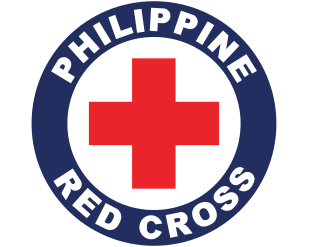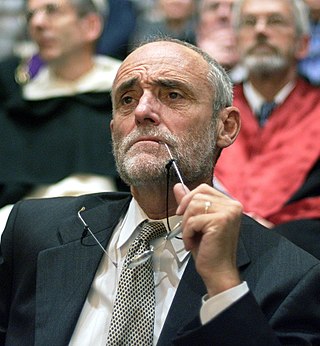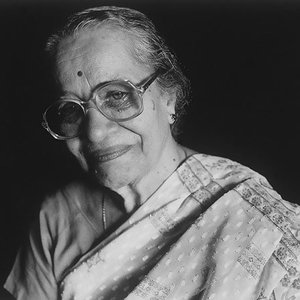Related Research Articles

The International Red Cross and Red Crescent Movement is a humanitarian movement with approximately 97 million volunteers, members and staff worldwide. It was founded to protect human life and health, to ensure respect for all human beings, and to prevent and alleviate human suffering. Within it there are three distinct organisations that are legally independent from each other, but are united within the movement through common basic principles, objectives, symbols, statutes and governing organisations.

The Geneva Convention relative to the Protection of Civilian Persons in Time of War, more commonly referred to as the Fourth Geneva Convention and abbreviated as GCIV, is one of the four treaties of the Geneva Conventions. It was adopted in August 1949, and came into force in October 1950. While the first three conventions dealt with combatants, the Fourth Geneva Convention was the first to deal with humanitarian protections for civilians in a war zone. There are currently 196 countries party to the 1949 Geneva Conventions, including this and the other three treaties.
International humanitarian law (IHL), also referred to as the laws of armed conflict, is the law that regulates the conduct of war. It is a branch of international law that seeks to limit the effects of armed conflict by protecting persons who are not participating in hostilities and by restricting and regulating the means and methods of warfare available to combatants.

The International Conference of Reformed Churches (ICRC) is a federation of Reformed or Calvinist churches around the world. The ICRC was founded in 1981. The ICRC convenes international meetings every four years. Its theology is more conservative than the larger World Communion of Reformed Churches and is similar to that of the World Reformed Fellowship. The participating churches endorse the Reformed confessions. Moderator of the ICRC is Rev. Dr Dick Moes.

Marcel Junod was a Swiss medical doctor and one of the most accomplished field delegates in the history of the International Committee of the Red Cross (ICRC). After medical school and a short position as a surgeon in Mulhouse, France, he became an ICRC delegate and was deployed in Ethiopia during the Second Italo-Abyssinian War, in Spain during the Spanish Civil War, and in Europe as well as in Japan during World War II. In 1947, he wrote a book with the title Warrior without Weapons about his experiences. After the war, he worked for the United Nations Children's Fund (UNICEF) as chief representative in China, and settled back in Europe in 1950. He founded the anaesthesiology department of the Cantonal Hospital in Geneva and became the first professor in this discipline at the University of Geneva. In 1952, he was appointed a member of the ICRC and, after many more missions for this institution, was Vice-President from 1959 until his death in 1961.

The Philippine Red Cross is a non-profit humanitarian organization and a member of the International Red Cross and Red Crescent Movement.

The International Committee of the Red Cross is a humanitarian organization based in Geneva, Switzerland, and is a three-time Nobel Prize Laureate. State parties (signatories) to the Geneva Convention of 1949 and its Additional Protocols of 1977 and 2005 have given the ICRC a mandate to protect victims of international and internal armed conflicts. Such victims include war wounded persons, prisoners, refugees, civilians, and other non-combatants.

Pierre Krähenbühl is a Swiss national who has served as Commissioner General for the United Nations Relief and Works Agency for Palestine Refugees in the Near East (UNRWA) from March 2014 to November 2019. Before that, he served from July 2002 as Director of Operations at the International Committee of the Red Cross (ICRC).

Jakob Kellenberger is a former Swiss diplomat and former president of the International Committee of the Red Cross (ICRC). Since 2013 he has been the president of swisspeace.

The International Federation of Red Cross and Red Crescent Societies (IFRC) is a worldwide humanitarian aid organization that reaches 160 million people each year through its 192-member National Societies. It acts before, during and after disasters and health emergencies to meet the needs and improve the lives of vulnerable people. It does so independently and with impartiality as to nationality, race, gender, religious beliefs, class and political opinions.

Carl Jacob Burckhardt was a Swiss diplomat and historian. His career alternated between periods of academic historical research and diplomatic postings; the most prominent of the latter were League of Nations High Commissioner for the Free City of Danzig (1937–39) and President of the International Committee of the Red Cross (1945–48).

The Geneva Conventions are four treaties, and three additional protocols, that establish international legal standards for humanitarian treatment in war. The singular term Geneva Convention usually denotes the agreements of 1949, negotiated in the aftermath of the Second World War (1939–1945), which updated the terms of the two 1929 treaties and added two new conventions. The Geneva Conventions extensively define the basic rights of wartime prisoners, civilians and military personnel, established protections for the wounded and sick, and provided protections for the civilians in and around a war-zone.

The Algerian Red Crescent is an Algerian humanitarian volunteer organization founded in 1957. It has been recognized by the International Red Cross and Red Crescent Movement only since 1963.

Targeted Killing in International Law is a book about the legality of targeted killing, written by Nils Melzer. It was first published by Oxford University Press in May 2008. The book explores the history of targeted killing as a government strategy by multiple countries including the United States, the United Kingdom, Israel, Switzerland and Germany; for both military and law enforcement purposes. Melzer argues that directly after the September 11 attacks in the United States, perceptions of the tactic became more positive.

Jean Simon Pictet was a Swiss citizen, jurist, legal practitioner working in international humanitarian law. First as a secretary-jurist, and then as a senior executive and Vice-President of the International Committee of the Red Cross (ICRC), Pictet was instrumental in drafting the 1949 Geneva Conventions for the protection of victims of war, their Commentaries, and negotiating the 1977 Additional Protocols. He also proposed the Red Cross Movement’s seven Fundamental Principles, which were adopted at Vienna in 1965: Humanity, Impartiality, Neutrality, Independence, Voluntary Service, Unity and Universality. In 1989, an international humanitarian law competition for students was founded and named after him.

Peter Maurer is a Swiss diplomat who was the President of the International Committee of the Red Cross (ICRC) from 1 July 2012 until October 2022 and is currently President of the Basel Institute on Governance. Maurer was born in Thun, Switzerland.

Kamal Jayasing Ranadive was an Indian biomedical researcher known for her research on the links between cancers and viruses. She was a founding member of the Indian Women Scientists' Association (IWSA).
Maurice Rossel was a Swiss doctor and International Committee of the Red Cross (ICRC) official during the Holocaust. He is best known for visiting Theresienstadt concentration camp on 23 June 1944; he erroneously reported that Theresienstadt was the final destination for Jewish deportees and that their lives were "almost normal". His report, which is considered "emblematic of the failure of the ICRC" during the Holocaust, undermined the credibility of the more accurate Vrba-Wetzler Report and misled the ICRC about the Final Solution. Rossel later visited Auschwitz concentration camp. In 1979, he was interviewed by Claude Lanzmann; based on this footage, the 1997 film A Visitor from the Living(fr) was produced.
During World War II, the Theresienstadt concentration camp was used by the Nazi SS as a "model ghetto" for fooling Red Cross representatives about the ongoing Holocaust and the Nazi plan to murder all Jews. The Nazified German Red Cross visited the ghetto in 1943 and filed the only accurate report on the ghetto, describing overcrowding and undernourishment. In 1944, the ghetto was "beautified" in preparation for a delegation from the International Committee of the Red Cross (ICRC) and the Danish government. The delegation visited on 23 June; ICRC delegate Maurice Rossel wrote a favorable report on the ghetto and claimed that no one was deported from Theresienstadt. In April 1945, another ICRC delegation was allowed to visit the ghetto; despite the contemporaneous liberation of other concentration camps, it continued to repeat Rossel's erroneous findings. The SS turned over the ghetto to the ICRC on 2 May, several days before the end of the war.

The archives of the International Committee of the Red Cross (ICRC) are based in Geneva and were founded in 1863 at the time of the ICRC's inception. It has the dual function to manage both current records and historical archives. The general historical archives are openly accessible to the general public up to 1975.
References
- ↑ ICRC Directorate Archived October 21, 2006, at the Wayback Machine . ICRC website. 7 May 2005.